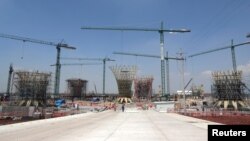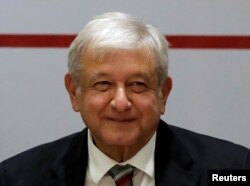Mexico risks losing long-term passenger growth and billions of dollars if it fails to go through with building a new hub in the capital to alleviate congestion, an executive with the International Air Transport Association (IATA) said on Tuesday.
Mexico's incoming government last week postponed a decision on whether to complete a partially constructed new airport in Mexico City, saying the public should be consulted on the fate of the $13-billion hub, which the next president initially opposed.
President-elect Andres Manuel Lopez Obrador said the project was tainted by corruption prior to his July 1 landslide election victory, and had pressed for an existing military airport north of the capital to be expanded instead.
Without the new airport, around 20 million fewer passengers would fly to Mexico City starting in 2035, year over year, said Peter Cerda, regional vice president in the Americas for IATA.
It would also mean a long-term loss of $20 billion from Mexico's GDP and cost the country 200,000 jobs, according to an airline-industry study on the financial impact of not building the new airport, Cerda said.
IATA, the Montreal-based trade association, has 290 member airlines which together transport about 82 percent of global air traffic.
Passenger traffic is expected to double by 2035 on a global basis, including Latin America, Cerda said in an interview.
"If you don't build an airport that's able to meet the needs of the next 50 years you just cannot continue to grow," Cerda said on the sidelines of the International Aviation Forecast Summit in Denver. "And that has financial implications for the country."
Work began on the new airport, which is a few miles northeast of the current one, in 2015. The present airport, located in the east of Mexico City, has become increasingly saturated by rising air traffic and has no room to expand.
"This is an airport that was built for 32 million passengers a year and currently we have 45 million passengers traveling through," Cerda said.
Cerda urged Mexico to make any decision on "technical justifications" rather than "public outcry that may not fully understand the consequences."






